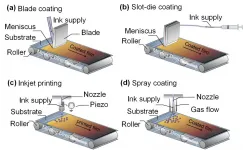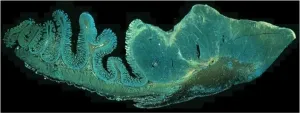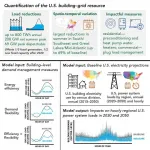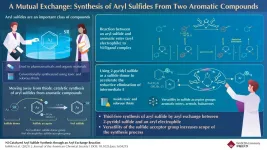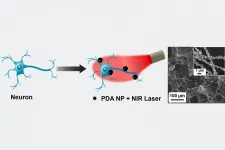Scientists link frailty and neurocognitive decline in childhood cancer survivors
St. Jude Children's Research Hospital scientists have shown that frailty contributes to neurocognitive decline in young adult survivors of childhood cancer
2021-07-21
(Press-News.org) Scientists at St. Jude Children's Research Hospital have found a link between post-cancer treatment frailty and neurocognitive decline in young adult childhood cancer survivors. A paper on this work was published today in the Journal of Clinical Oncology.
Though frailty is often associated with the elderly, 8% of young adult childhood cancer survivors meet the criteria for frailty. This study confirms that those who undergo childhood cancer treatment can experience frailty, which can create an early onset of neurocognitive decline in young adults. This study will help with further research to prevent such neurocognitive decline.
"We think this is going to put more attention on this accelerated aging phenotype in young adult survivors," said first author AnnaLynn Williams, Ph.D., St. Jude Epidemiology and Cancer Control. "It's going to make it a bit easier for us to identify the survivors most at risk for neurocognitive decline.
"We can use this information, and the rest of our frailty research, to design a broad intervention that might simultaneously help us improve frailty in survivors as well as neurocognitive functioning," Williams said.
More important than previously recognized
Cancer-related neurocognitive impairment is present in up to 35% of childhood cancer survivors. It can influence all aspects of their lives, including their physical functioning and daily activities.
Over the span of five years, researchers found that survivors who experienced treatment-related frailty had significantly greater declines in memory, attention, processing speed and other functions as compared to survivors who did not experience frailty.
The intensive chemotherapies that young adult survivors experience during their childhood years are known to contribute to health problems later in life. Frailty is just one such late effect of care.
This study and many others relied on data from the St. Jude Lifetime Cohort study (St. Jude LIFE). This study brings long-term childhood cancer survivors back to St. Jude for regular health screenings throughout their adult lives. To date, more than 4,300 participants and 580 controls have undergone comprehensive health evaluations tracking a wide range of health outcomes, such as cardiac, reproductive, neuromuscular, neurocognitive and psychosocial function, among others.
"Our work has shown that childhood cancer survivors are at an increased risk of frailty," said corresponding author Kirsten Ness, Ph.D., of St. Jude Epidemiology and Cancer Control. "Since frailty has now been shown to contribute to neurocognitive deficits among other health problems, it is increasingly apparent that addressing frailty may aid this patient population.
"This is why St. Jude LIFE studies are so important," Ness continued. "It allows us to identify risk factors for poor health outcomes in the the next generation of children with cancer so we can provide interventions to help them."
INFORMATION:
Authors and Funding
The study's other authors are Carrie R. Howell, University of Alabama at Birmingham; and Kevin Krull, Pia Banerjee, Tara Brinkman, Sue Kaste, Robyn Partin, Deokumar Srivastava, Yutaka Yasui, Gregory Armstrong, Melissa Hudson and Leslie Robison, all of St. Jude.
The study was funded by the National Institutes of Health (R01CA174851, K00CA222742, U01CA195547, and P30CA21765), and ALSAC, the fundraising and awareness organization of St. Jude.
St. Jude Children's Research Hospital
St. Jude Children's Research Hospital is leading the way the world understands, treats and cures childhood cancer and other life-threatening diseases. It is the only National Cancer Institute-designated Comprehensive Cancer Center devoted solely to children. Treatments developed at St. Jude have helped push the overall childhood cancer survival rate from 20% to 80% since the hospital opened more than 50 years ago. St. Jude freely shares the breakthroughs it makes, and every child saved at St. Jude means doctors and scientists worldwide can use that knowledge to save thousands more children. Families never receive a bill from St. Jude for treatment, travel, housing and food -- because all a family should worry about is helping their child live. To learn more, visit stjude.org or follow St. Jude on social media at @stjuderesearch.
[Attachments] See images for this press release:

ELSE PRESS RELEASES FROM THIS DATE:
2021-07-21
To reach the target of carbon neutral, a transition from fossil energy to renewable energy generation is indispensable. Photovoltaic technology is considered as one of the most prominent sources of renewable energy. For decades, about 90% of global solar cell market has been dominated by silicon solar cells. Although the price of silicon solar panels decreases year by year, it is a big challenge to significantly reduce its manufacturing cost further. Hence, next-generation photovoltaic technologies are in urgent need of new materials and novel techniques. Recently, metal halide perovskite solar cells (PSCs) have attracted extensive attention from both academia and industry, due to their excellent photoelectric conversion efficiency and great commercial potential.
Metal halide perovskite ...
2021-07-21
One of the major challenges in modern cancer therapy is the adaptive response of cancer cells to targeted therapies: initially, these therapies are very often effective, then adaptive resistance occurs, allowing the tumor cells to proliferate again. Although this adaptive response is theoretically reversible, such a reversal is hampered by numerous molecular mechanisms that allow the cancer cells to adapt to the treatment. The analysis of these mechanisms is limited by the complexity of cause and effect relationships that are extremely difficult to observe in vivo in tumor samples. In order to overcome this challenge, a team from the University of Geneva (UNIGE) ...
2021-07-21
In the United States, climate change is controversial, which makes communicating about the subject a tricky proposition.
A recent study by Portland State researchers Brianne Suldovsky, assistant professor of communication, and Daniel Taylor-Rodriguez, assistant professor of statistics, explored how liberals and conservatives in Oregon think about climate science to get a better sense for what communication strategies might be most effective at reaching people with different political ideologies. The study was published in Climatic Change in June.
Prior studies have shown that exposing climate change skeptics, ...
2021-07-21
Over the past six months, the World Health Organization has categorized four SARS-CoV-2 variants as being "of concern" because they are more transmissible or may escape the immune response. They have been termed the Alpha, Beta, Gamma and Delta variants. Scientists from the Institut Pasteur, in collaboration with the French National Health Insurance Fund (CNAM), Ipsos and Santé publique France, conducted a nationwide case-control study to evaluate the effectiveness of mRNA vaccines against symptomatic forms of SARS-CoV-2 infection, be that non-variant virus or the Alpha and Beta variants. The results show that the two-dose vaccination regimen of mRNA vaccines provides 88% protection against non-variant virus, 86% against the Alpha variant and 77% against the Beta ...
2021-07-21
Tsukuba, Japan - Rice is the world's most commonly grown and consumed crop. It also supports lives and livelihoods, especially in low- and middle-income regions. As such, methods for securing abundant and profitable rice harvests are key in global food security.
The System of Rice Intensification (SRI) offers a repeatable, sustainable system for increasing rice yields. It brings together fundamental planting and harvesting techniques such as strategically spacing plants, minimizing water, and transplanting seedlings. These practices can be repeated in varying conditions. While SRI has been around since ...
2021-07-21
Since buildings consume 75% of electricity in the U.S., they offer great potential for saving energy and reducing the demands on our rapidly changing electric grid. But how much, where, and through which strategies could better management of building energy use actually impact the electricity system?
A comprehensive new study led by researchers from the Department of Energy's Lawrence Berkeley National Laboratory (Berkeley Lab) answers these questions, quantifying what can be done to make buildings more energy efficient and flexible in granular detail by both time (including time of day and year) and space (looking at regions across the U.S.). The research team, which also included scientists from the National Renewable Energy Laboratory (NREL), found that ...
2021-07-21
Aryl sulfide, an aromatic compound in which sulfur is attached to an aryl (a functional group derived from an aromatic ring), is found in biologically active materials effective against asthma, Alzheimer's disease, and cancer. As a result, chemists have shown a lot of interest in synthesizing aryl sulfides. Traditionally, carbon-sulfur (C-S) bond formation reactions between thiols and aryl electrophiles catalyzed by transition metals have been employed for aryl sulfide synthesis because of their high reliability. However, thiols have an unpleasant smell and are toxic. Could there be a way to synthesize aryl sulfides that avoids the ...
2021-07-21
A new study of almost 12,000 Australians has found one-third of the adult population has experienced pure cybercrime during their lifetime, with 14% reporting this disruption to network systems in the past 12 months.
With all forms of cybercrime already costing trillions every year globally, experts from the Australian Institute of Criminology (AIC) and Flinders University say the crimes involved substantial levels of personal victimisation including direct losses as well as the high cost of preventing future attacks.
A pre-COVID-19 snapshot of the cost of 'pure cybercrime' in 2019 has found an approximate ...
2021-07-21
Nanomaterials have been used in a variety of emerging applications, such as in targeted pharmaceuticals or to bolster other materials and products such as sensors and energy harvesting and storage devices. A team in the McKelvey School of Engineering at Washington University in St. Louis is using nanoparticles as heaters to manipulate the electrical activity of neurons in the brain and of cardiomyocytes in the heart.
The findings, published July 3, 2021, in Advanced Materials, have the potential to be translated to other types of excitable cells and serve as a valuable tool in nano-neuroengineering.
Srikanth Singamaneni, a materials scientist, and Barani Raman, a biomedical engineer, and their teams collaborated to develop a noninvasive technology that inhibits the electrical ...
2021-07-21
It's hard to save what you can't identify. That's been a problem for the endangered salt marsh harvest mouse, which is found only in the salty, brackish waters of the San Francisco Bay area. The mouse competes for space with about eight million humans, and more than three-quarters of its habitat has been eaten by development and land conversion. That loss is expected to increase amid rising sea levels.
Conserving the population has proven tricky, in part because it looks so much like another mouse in the area--the western harvest mouse--that is abundant throughout western U.S.
But scientists from UC Davis have developed a tool, a "decision ...
LAST 30 PRESS RELEASES:
[Press-News.org] Scientists link frailty and neurocognitive decline in childhood cancer survivors
St. Jude Children's Research Hospital scientists have shown that frailty contributes to neurocognitive decline in young adult survivors of childhood cancer

